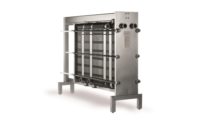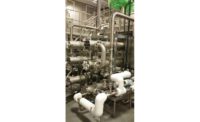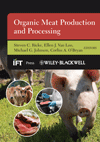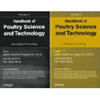Unique R Series scraped surface heat exchanger solves viscous product challenges

Different materials need different types of heat exchanger. For the most simple fluids such as water, plate heat exchangers are often sufficient, but as products become more challenging (such as minced meats, spreads or egg-based products), then different types of tubular and scraped surface heat exchangers are required. For those products with extremely high fouling potential, or those which benefit from constant agitation, then the HRS R Series of rotating scraped surface heat exchangers is ideal.
Designed for sanitary food industry applications, the R Series from HRS Heat Exchangers uses a rotary scraper rod which is capable of reaching velocities of 300 rpm, providing high levels of shear and mixing at the heat transfer surface which dramatically increases heat transfer rates. This makes it particularly suitable for challenging heat transfer applications, such as those where the product requires high pressures, has high viscosity, or where aeration is required.
The scraper rod features both a helical mixing spiral (which reduces the pressure drop in the tube) and a series of scraper blades. Together these provide a continuous scraping action which mixes highly viscous products and reduces fouling. The unique design enables high viscosity products to be pumped with reduced back pressure and lower energy use, in a compact unit which features a much smaller footprint than traditional heat exchangers for similar applications.
A unique gearbox design not only reduces noise, but also allows multiple tubes to be fitted inside a single shell from a single electrical drive, further increasing the available heat transfer area within the same shell footprint and aiding maintenance. Cleaning and maintenance is further improved by the unique sealing system used in the R Series which allows individual tubes to be removed for easy servicing and replacement if necessary.
Thanks to its helical spiral, in many applications the R Series can also be run in reverse, enabling much valuable product to be recovered before routine cleaning-in-place or product change-over without the need for additional pigging or flushing systems. Not only does this reduce costs and complexity, but saving product adds dollars to the bottom line.
HRS International Sales & Marketing Director Matt Hale comments, “Normally, when processing dense, viscous or sticky products such as minced meat, a certain amount will adhere to surfaces. This greatly reduces heat transfer, meaning that longer exposure is required to compensate. With its clever scraper design the R Series overcomes this problem, and also reduces product losses which can soon add up. The R Series can be emptied of the majority of the product without the need for any additional pumps or pressure systems, reducing both capital- and running-costs.”
The HRS R Series is available in two lengths (1 and 2 meters) and with one-, three- or six-tube options providing a range of surface areas between 0.35 and 4.2 m2. For larger installations multiple units can be combined in series and units can be mounted horizontally or vertically and internal baffles can be specified within the tubes to overcome situations where shell-side flow may be limited. This also means that it is possible to obtain complete counter-current flow between the shell-side and tube-side fluids for multi-pass designs. In other situations, such as condensing (e.g. stem heating) and evaporating (e.g. ammonia cooling) the baffles are not used, in order to improve performance.
The R Series is suitable for a range of uses in meat processing, including heating, cooling, pasteurization, crystallization and evaporation.
“For some materials, such as fats, purees and minced meats, increased turbulence is beneficial,” adds Matt. “With its small footprint, ease of maintenance and the ability to recover product, in these situations the unique design of the HRS R Series offers a number of advantages over other heat exchangers on the market.”
Looking for a reprint of this article?
From high-res PDFs to custom plaques, order your copy today!







